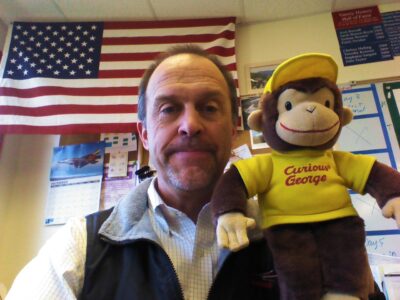 CURIOUS GEORGE VISITS ROBERT LOGAN’S HISTORY CLASSES
CURIOUS GEORGE VISITS ROBERT LOGAN’S HISTORY CLASSES
Robert Logan is a history teacher at Durango High School in Durango, Colorado. Several years ago, I attended his class to help with some of the English Language Learners, and it was here I developed an interest in the past. This led to my desire to write historical fiction. When I went to school, history was a subject I endured in order to meet graduation requirements. The other students and I sat in straight rows, faces forward, and listened to an hour of lecture. We had to read chapters in a boring history text, answer the questions, then turn the homework in. This is not how Robert runs his classroom. He invites the monkey, Curious George, to be his first guest.
Robert, why is Curious George the first guest students meet in your classroom?
The simple answer is, “because he is curious.” My basic belief is that students in general stop being curious about their world around grade 5. It’s at that stage they discover other interests that begin to consume their time, talents and energy, be it sports, video games, or other humans. The list is long. It is also when subjects begin to be divided by teachers who teach them, and when subjects become more difficult. Some students thrive in that environment, but many don’t see much relevance to their personal world with the subjects they are studying. By the time I see them in high school, they are well down the road of not caring about the subject as much as the grade in the class, or just not caring at all. It’s become too hard, too easy, too irrelevant, too — you name it.
I want them to see history with new (old) eyes. I want them to go back to being a 4th or 5th grader and ask the questions, “Why do people do the things they do? Would I do anything different if I were living in that time period? What motivates people to act in what seems to us today to be crazy ways?” It’s not so much about the when, although that needs to be understood, it’s more about the why and so what of life. 
What do you do in an effort to inspire students to get curious enough to learn from the past?
I seek to engage them daily in thought provoking questions. I seek to get them up and moving around as often as possible. I seek to have them think about what they would say/do/be if they were in the time period under study and took on a personality of that time period. The joy in learning history isn’t in the memorization, although that is sometimes important. It’s in the understanding that all humans have the same basic needs, interests and passions. It’s mostly about what we do with them that makes history a great place to explore life.
What important idea do you want your students to come away with after they’ve been in your history class?
History can be fun. History can be informative. History can teach us how to live life better. History is something we study and make each day of our lives. People are people no matter what time period we are looking at. There are more, but that’s a good starting point.
Which historical era is your favorite? Why?
Now that’s a tough question. I will have to provide a multiple response. 
Socially = Renaissance, 1920s
Politically = Modern era 1950-2000
Religiously = 1st 3 centuries (AD 1-300), 1920s-1970s
Intellectually = Enlightenment era, American Revolution
Technologically = the American Industrial Revolution and our current time
Economically = 1900’s to the present
Artistically = Renaissance




 VOLUNTEERING ON A MERCY SHIP
VOLUNTEERING ON A MERCY SHIP